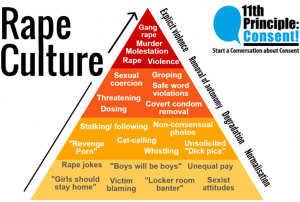This week’s post is a Q and A with our friend Gabriel Fontes, who interned with us last fall and has stayed on as a volunteer. Gabriel is a student at Brandeis University and leads workshops on Bystander Intervention. Since we are coming to the end of Sexual Assault Awareness Month, we asked Gabriel if he would talk to us about the work that he does.
Tell us a little about yourself!
Hey there! My name is Gabriel. I am an aspiring High School English teacher studying English, African & Afro-American studies and Women, Gender & Sexuality studies at Brandeis University.
How did you get involved with REACH? What have you been doing?
I got involved with REACH through an experiential learning course at Brandeis. I have been providing weekly childcare at the office as well as taking up other miscellaneous volunteer opportunities such as helping out at the Holiday Party.
Tell us about the work that you do at Brandeis.
I lead Bystander Trainings through the Office of Prevention Services. We train students to recognize inappropriate behaviors, take responsibility for intervening and develop skills to effectively and safely step in. While our focus is on preventing sexual assault, the skills are transferable to other situations.
The term “active bystanders” has been thrown around quite a bit recently. Can you tell us what it means?
An active bystander is someone who not only witnesses a potentially dangerous or abusive situation, but also steps in. There are many different ways to intervene and some are better than others. For instance, you could intervene physically and make the situation more dangerous for everybody.
Something I always say during my presentations is “We don’t need heroes!” I want to dissuade participants from emulating movie depictions of bulky men grabbing rapists by the collar and beating them up.
That’s why at Brandeis we use the term “pro-social bystander.” A Pro-Social Bystander focuses first and foremost on the safety of themselves and the person in the target position. They aim to de-escalate situations and don’t seek confrontation. Lastly, they invite accountability from people around them. The most effective pro-social bystander calls in other people to help intervene.
Why did you get involved in this work?
I have too many friends and loved ones who have been sexually assaulted.
Why do you think it’s important to do this work?
When I was in high school I played varsity sports. In those spaces my social status and feelings of self-worth were based on my athleticism and ability to sleep with girls. I want to work to fight these toxic notions of masculinity, especially during the formative years of high school. As an aspiring English teacher, I want to provide varied and compassionate models of masculinity for my future students.
What would you tell someone who is nervous about saying or doing the wrong thing?
It makes sense to be nervous! There are always social risks to stepping in. During my trainings students have said they are worried about looking nosy, jealous or awkward.
Three thoughts on this:
One) You don’t have to do it alone! Turn to your friend, ask the host, the cashier, whoever is around to help out. Say, “Does that look strange to you?” or “Will you walk with me as I check in with them?” If you don’t feel comfortable intervening yourself, find someone with more social capital.
Second) There is no singular script for intervening! There are many options: You can Directly ask, Distract, Delegate tasks to others or Distance the target from the perpetrator. Find your personal style.
Third) Except for situations where you risk personal injury or other forms of harm, it is always better to step in. The stakes are too high not to! The effects of sexual trauma can last a lifetime.
Sometimes it’s hard for folks to know where to begin… What are some ways that people can become pro-social bystanders? 
During our presentation we show a rape culture pyramid that is similar to the one shown here (from 11th Principle: Consent!). My advice is to start at the bottom. Don’t wait for a situation in the orange or red zone. Call out victim blaming, sexist attitudes and rape jokes. These create the foundation for a culture that permits violent sexual assault.
To learn more about being an active, pro-social bystander and preventing sexual assault, click here to learn more about our Prevention Programs.





